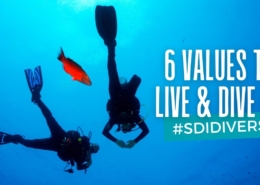Can I dive with a Disability?
What exactly is a disability? Is it something that makes one person different from another? I am sure every day you see people different from yourself. Does that make them a person with a disability? Years ago, I learned that in every specific case of scuba training that may or may not involve a person with a disability, perception is essential, and it may be different with each course. I am sure that almost every instructor out there has had students who were unwilling to complete a swim test when they were physically able or had a student who could not overcome a basic fear associated with the use of scuba equipment. Were those people with disabilities because they could not complete a basic skill?
Let me tell you a story…
Six years ago, I met a young man who was fifteen years old. He wanted to learn to scuba dive and had been included in a charitable program that provided unique activities to children with disabilities. This young man had one leg amputated above the knee shortly after birth and the other amputated just below the knee years later. The day we traveled to the pool, I was unsure what I could do for him that would be supportive, but not offensive. I could not move fast enough. In moments, he had removed his prosthetics and walked on his hands to the edge of the water and was waiting patiently. To my amazement, he performed every task better than most of the students that I work with outside of unique programs.
Overcoming and Adapting
During the course, I noticed he was using his right hand to work the button on his power inflator that came over his left shoulder. Rather than stopping him, I chose to pay closer attention and realized he was missing three fingers on his left hand. I was stunned. This child had adapted in moments without even asking questions or commenting. I felt like a fool for not noticing what could have been a problem for a traditional student. As we progressed, the only skill I worried about was a giant stride entry. Despite my worry, when we decided to work on that skillset, I presented the concept and the young man showed me he could support himself and his gear with his amputations and literally “step” off into the water. We all know he will never use this type of entry, but he could do it, and he proved it to me before I could suggest something different.
Later, I learned that my student had never met his parents outside of digital communications. He was born into a family in a country where parents were not allowed to have more than a certain number of children. He was put up for adoption and given a new life by a kind couple in the United States. He was only a few months away from turning sixteen, and after that day he could finally visit his birth parents. His adoptive parents already had the plane tickets and travel arrangements were planned. This child had dealt with more in fifteen years of life than most people experience in eighty years. He lost his fingers and legs, he was torn from his family at birth, and he was not even allowed to visit the country where he was born. Despite everything and a sobbing group of dive professionals standing around him, this young man was excited for whatever came next and was very proud of everything he had accomplished at that point in his life.
Unique circumstances don’t always call for unique courses.
Personally, I dislike the idea of categorizing disabilities on the face of a certification card, but sometimes we must be realistic about safety limits. Any time I begin a certification program for a person or group who may fall into a disability category, nothing changes unless it must! I teach the course like any other Open Water Scuba Diver Program until we must make a change based on their ability. In most cases, the student may meet the objectives for a common Open Water Card. Conversely, certain impairments or physical differences may require support from a buddy. In those cases, the instructor diverts from a traditional teaching track and utilizes educational skillsets for the diver and/or a buddy to minimize risk to everyone in the water. The reality is that we, as dive instructors, teach people to enjoy the underwater world as safely as possible. We are not there to judge anyone, hold a person back, or tell a person they are not capable of something. In my experience, most people with disabilities who ask to go scuba diving are far more capable than the average individual.
So, can a person dive with a disability?
YES!!! With proper instruction and safe planning, diving may be a real possibility. Students must still complete skill set proficiency and, in some cases, a buddy or two may also require training, but the Scubility program from Scuba Diving International allows an instructor to work with individuals who may have disabilities. The truth of the matter is that if a medical doctor who understands the situation and scuba diving approves, and if a student is mentally competent to understand teaching concepts, then the potential for diving is most likely there.
As a dive professional, I encourage many of you out there to expand your teaching abilities. If you are not a Scubility instructor, go become one!! Expand your student base and if nothing else, help put a little excitement back in someone’s life. Sometimes, giving a person a little outdoor adventure when others are not willing to help is the absolute definition of why we dive. We expand peoples’ worlds and we present a brand-new environment where gravity does not quite have the same effect on the human body.









Dejar un comentario
¿Quieres unirte a la conversación?Siéntete libre de contribuir!